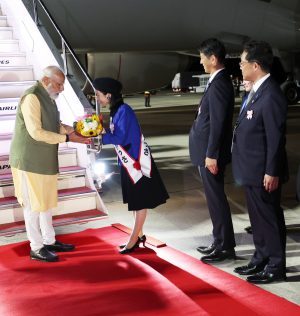Indian Prime Minister Narendra Modi is visiting Hiroshima, Japan, from May 19 to 21 where he will represent India as an invited country at the 49th G-7 Summit. This engagement comes amid a busy diplomatic schedule for India, which holds the presidency of the G-20 and the Shanghai Cooperation Organization (SCO) for 2023. The G-7 Summit is thus a platform for India to take its many multilateral engagements forward. For the G-7, engaging with India is imperative for several reasons.
First, with a GDP of $2.66 trillion, India’s economy is larger than three member countries of the G-7 – France, Italy, and Canada. According to the International Monetary Fund (IMF), India is one of the fastest growing economies in the world and is expected to grow at 5.9 percent in 2023-2024. India is also the fastest growing economy in Asia. The World Bank has said that India’s growth rate is the highest among the seven largest emerging-market and developing economies.
India’s economic growth is in contrast with that of Western countries, most of which are facing stagnant growth prospects. Anne-Marie Gulde-Wolf, deputy director for the Asia and Pacific department of the IMF, said that India could be a key economic engine capable of driving global growth through consumption, investment, and trade. As an outlier among world’s major economies, India remains an attractive investment destination due to factors such as market potential, low manufacturing costs, business reforms, and a favorable industrial climate.
Recently India surpassed China as the most populous country in the world. With 68 percent of the population of working age (15-64 years) and 65 percent of the population under the age of 35, India offers a young and abundant skilled and semi-skilled work force.
Second, along with the United States and Japan, the European countries are formulating their policies to engage more with the Indo-Pacific region. In the past few years, the United Kingdom, France, and Germany – G-7 members from Europe – have formulated their own Indo-Pacific strategies. Italy too has shown inclination recently to engage with the Indo-Pacific region.
With the global geopolitical and economic epicenter shifting to the Indo-Pacific, European countries are keen to benefit from the economic opportunities that the region offers. However, the Indo-Pacific has its own challenges with a belligerent China expanding its strategic and economic footprint. For the Western countries, India has emerged as a major strategic partner to contain China, particularly in the Indian Ocean component of the Indo-Pacific region. Of the G-7 members, India has strategic partnerships with the U.S., the U.K., France, Germany, and Japan. India’s relations with Italy are rapidly expanding in the strategic domain.
Third, India has unexpectedly become a transit country to resolve the European energy crisis caused by the Russia-Ukraine war. Before the war started, Europe secured around 40 percent of its oil and gas supply from Russia. European countries plunged into an energy crisis as they reduced energy purchases from Russia over the course of the past year.
For its part, Russia offered its oil to India at discounted prices to compensate for the loss incurred due to European countries reducing their oil imports from Russia. As a result of securing energy supplies at discounted prices, India has increased its oil purchases from Russia. Russia has become India’s top supplier of oil.
However European countries have also benefited from India’s oil purchases from Russia. India has become a backdoor for the European countries to purchase Russian oil. The ban on Russian oil has led to European countries’ increased reliance on India for securing energy supply. Russian crude oil, after undergoing refining process in India, is finding its way into Europe. India became the largest supplier of refined fuels to Europe in April. This arrangement has ensured that India was indirectly responsible for easing the burden on the European economies to a certain extent.
Fourth, India is one of the few countries in the world to have cordial ties with both Russia and the West. The war in Ukraine has dragged on for more than one year with no end in sight. The situation at present could be best described as heading toward a stalemate.
As Western countries continue supplying arms to Ukraine, Moscow has also been intensifying attacks on Kyiv. The war has already disrupted economies and supply chains for many Western countries. India could, through direct or indirect mediation, offer a face-saving option to both the warring sides in near future. India’s approach of balancing ties with Russia and the West could assume importance in case of any possibility of dialogue and diplomacy to end the war.
Whether or not the G-7 expands to a G-8 again, this time to accommodate India, remains to be seen. However India’s engagements with the G-7 are imperative to address the challenges the grouping is facing.

































